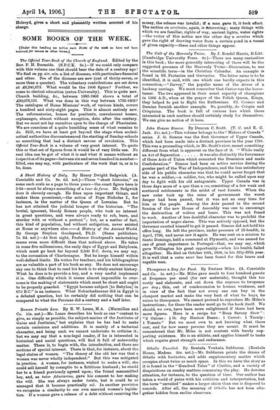Roman Private Law. By R. W. Lease, M.A. (Macmillan and
Co. 10s. net.)—Mr. Lease describes his book as one "content to give, as simply as possible, the subject-matter of the Institutes of Gains and Justinian," but explains that he has had to make certain omissions and additions. It is mainly of a technical character, and being such we cannot undertake to criticise it; but we may say that a non-legal reader, if he is interested in historical and social questions; will find it full of noteworthy matter. There is, to begin with, the introduction, and there are sections of special interest. There is that for instance, about the legal status of women. "The theory of the old law was that a woman was never wholly independent." But this was mitigated in practice. A woman, for instance, wished to make a will; she could sell herself by coemptio to a fictitious husband ; he resold her to a friend previously agreed upon; the friend manumitted her, and, as tutor fuitteiarius, gave his consent to her making the will. She was always under tutela, but it could be so managed that it became practically nil. In another provision we recognise a similarity to our own married women's legisla- tion.• If a woman gave a release of a debt without receiving the money, the release was invalid ; if a man gave it, it took effect. The section on servitutes, again, is interesting ; many things with which we are familiar, rights of way, ancient lights, water rights —the writer of this notice saw the other day a servitus which gave the right of drawing water from a certain pond in a vessel of given capacity—these and other things appear.






































 Previous page
Previous page